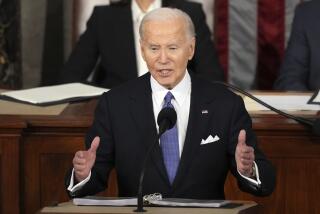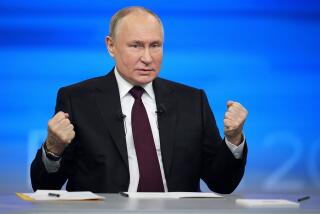Hussein Tries Carrot-and-Stick Ploy in Seeking National Unity : Iraq: Beleaguered strongman mixes promises of political reform with threats of hard retribution against uprising.
- Share via
AMMAN, Jordan — President Saddam Hussein on Saturday mixed promises of political reform with threats of hard retribution in an appeal for Iraqi unity in the face of rebellion.
Warning that the insurgencies that have swept Iraqi cities since the end of the Persian Gulf War “will lead us only into a dark tunnel,” Hussein declared that “the great Iraqi people reject this unnationalistic approach, this treacherous approach.”
“With the help of God,” he told an evening audience on nationwide radio and television, “we have crushed the sedition in the cities of the south,” where Shiite Muslims began the revolt more than two weeks ago.
And without mentioning Iran by name, he accused Iraq’s old enemy of fomenting the fighting there. Iraqis, he said, “did not expect neighbors with whom we have attempted to establish an honorable peace . . . to allow their territory to be used as a launching pad for such harm and treachery.”
Looking fit, his voice strong, Hussein wore a green military uniform with the epaulets of commander in chief as he delivered the hourlong address. It was his first appearance on radio or television since Feb. 26, two days into the American-led ground war that drove his forces from Kuwait.
“Is this nationalism to divide Iraq into sections and minorities? Is this democracy?” asked the mustachioed strongman, who has ruled Iraq with an iron fist since he came to power 12 years ago at the head of the ruling Arab Baath Socialist Party.
He pledged that a new Cabinet would be named soon to work “under the leadership” on a program of postwar reconstruction and reform. Hussein said a draft of a new constitution establishing a multi-party political system would be reviewed and put to a popular referendum, a promise he first made two years ago in the wake of another crisis, the 1980-88 Iran-Iraq War.
Repeatedly invoking Iraqi dignity and the country’s long history of civilization, the 53-year-old president called for unity in support of his beleaguered regime, declaring, “I and my companions in the leadership are confident the Iraqi people can overcome this plight.”
And if resistance continues, he warned, the military will show no mercy. Referring to the insurgency in the northern cities, spearheaded by Kurdish guerrillas who have tried--and failed--in past decades to pry some sort of autonomy from Baghdad governments, Hussein said, “Any movement (toward separation) by the Kurds never led to anything but failure.”
On Saturday, reports from Turkey said that the flag of the Kurdish nationalist movement was flying all along the Iraqi-Turkish frontier as clashes abated between Iraqi military forces and anti-Baghdad Kurdish rebels apparently now in control of the strategic northwest of Iraq. The flag’s horizontal stripes of yellow, red and green are the national colors of all Kurds, a Muslim group of mountain people numbering 25 million and divided among Iraq, Iran, Syria, the Soviet Union and also Turkey, where more than half of them live.
“Kurdish flags are flying in many places,” declared Orhan Dogan, a civic leader in the Turkish border town of Cizre. “There are no more reports of fighting. The guerrillas there appear to be fully in control.”
Earlier Saturday, local reports had spoken of sporadic shooting around Zakhu, a town visible nine miles from the Turkish border. Guerrillas were reported to have captured Zakhu after fierce fighting and artillery battles on Friday.
Iraq’s northwestern corner is the only real Iraq-Turkey crossing point, used by 5,000 trucks a day before the Gulf crisis. Nearby is the big twin Iraq-Turkey oil pipeline through which Baghdad transported a large share of its oil exports before the U.N. Security Council imposed sanctions on Iraq, prompting Turkey to close the pipeline at its terminal on the Mediterranean Sea.
A senior Turkish commander, Gen. Hikmet Koksal, was reported to be at Habur, a major abandoned customs area that Turkish newspapers said had fallen to the guerrillas as well.
Turkish officials declined to comment on unconfirmed Turkish newspaper reports that Koksal was negotiating either with the Kurdish guerrillas wanting food or for the surrender of an Iraqi army brigade that had taken refuge near the border.
In his broadcast address, Hussein blamed outsiders for fomenting Iraqi Kurds in the past and said, again mentioning no names, “those today are repeating the same game.” Most of the countries with Kurdish populations--including Iraq--have stirred dissent among the mountain people aimed at causing problems for their neighbors, he charged.
“When there is no longer a need for their (the outsiders’) cause,” Hussein said, the Kurds “are dumped into the garbage, (and in this rebellion) they will face the same fate.”
Hussein worked hard on damage control in his speech, insisting that isolated incidents of insurrection were being “generalized,” painting a picture of rebellion worse than the reality.
But reports from rebel spokesman living in exile indicated that Hussein’s regime still has major problems on its hands and that his military is cracking down hard.
A statement released by the secular Shiite Muslim Al Dawaa Party said that despite Baghdad’s claims, the army was unable to control either Karbala or Najaf, the two major Shiite cities in the south. But the insurgent group admitted that its forces were under heavy fire, saying that more than 1,400 people had been killed by “savage bombardment” of the two cities.
That appraisal matched most of the recent reports from the south: The rebels are holed up in some quarters of the cities and are under artillery fire, but government soldiers have been unable to take and hold all urban areas.
For the past two days, rebel spokesmen, both Shiites and Kurds, have also accused Hussein’s forces of using napalm in their attempts to put down the uprising, but such reports have not been independently confirmed. Normally, napalm is delivered in an aerial bomb, and U.S. military authorities in Saudi Arabia have warned Baghdad against using aircraft in the fighting.
Meanwhile, the official Iranian News Agency quoted a radio called Voice of Iraq’s Revolution as saying that the northern Iraqi center of Mosul, Iraq’s third-largest city, had fallen to rebel control. Again, there was no independent confirmation.
Hussein, in his address, appeared equally distressed by the situation in the north and the south. Of the latter, he told Iraqis: “They (the rebels) attacked isolated barracks and retreating army units and captured arms and equipment. They burned the people’s property and killed state and party officials, army officers and civilians.”
He spoke only briefly of the Persian Gulf War in his first address since meeting allied demands for a cessation of hostilities, referring to the military onslaught that crushed his army as “fateful events” and “the aggression of 30 nations.” The Iraqi invasion of Kuwait last year he called merely “the events of August.”
Nothing in the speech admitted wrongdoing by his regime, which he insisted still carries the banner of Palestinian independence. His only reference to possible miscalculations came as a reference to “traps laid” by the allied coalition in the months leading to war.
Unrepentant, Hussein nevertheless seemed deeply concerned about the brush fire of rebellion, particularly one coming on the heels of a lost war. He blamed the trouble on anarchists and accused them of working “in cooperation with foreign forces” and being “fueled by hatred.”
“God forbid this is the fate of the country,” he told his audience, which was limited by postwar power outages in Baghdad and other cities.
His Baathist regime, Hussein said in appealing for a core of support, “helped Iraq, and helped to build it, to build a future in Iraq.
“Was this a regime that respects only one faction? The Iraqis know that we have worked for progress and prosperity by the whole of Iraq.”
Free-lance journalist Hugh Pope in Istanbul contributed to this story.
More to Read
Sign up for Essential California
The most important California stories and recommendations in your inbox every morning.
You may occasionally receive promotional content from the Los Angeles Times.













